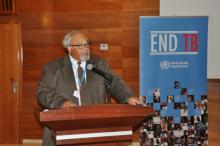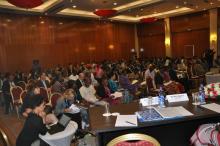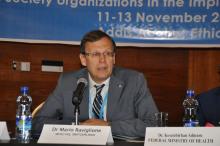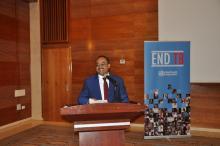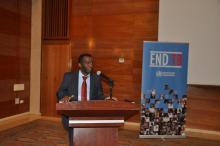Community Engagement Key to Ending the TB Epidemic
ADDIS ABABA, 11 November 2015 | Nearly 90 communities, non-governmental (NGOs) and civil society organizations (CSOs) are meeting for a landmark consultation in Addis Ababa today to ramp up efforts to end tuberculosis (TB) - the leading infectious disease killer worldwide along with HIV.
Dr Kesetebirhan Admasu, Minister of Health of the Federal Democratic Republic of Ethiopia, and Dr Eric P. Goosby, United Nations Special Envoy on TB, spoke at the opening of the three-day meeting, organized by the World Health Organization’s (WHO) Global TB Programme. The meeting will use plenary sessions, group work and a market place where 30 TB-engaged and unengaged NGOs will share their experience and showcase their achievements and results in fighting the epidemic in their communities.
“Communities have a critical role to play in ending the TB epidemic by 2030,” said Dr Mario Raviglione, Director of WHO’s Global TB Programme. “In Ethiopia, thousands of community volunteers and health extension workers are mobilizing to identify children and adults ill with TB in their communities, ensuring that they access treatment and are ultimately cured. This is a great model of harnessing the power of communities to end TB.”
In 2014 alone, 9.6 million people fell ill with TB and 1.5 million died. Over 95% of TB deaths occur in low- and middle-income countries like Ethiopia, and it is among the top five causes of death for women aged 20-59 years. The disease also affects children. In 2014, an estimated one million children became ill and 140 000 children died of TB. Tuberculosis is also a leading cause of death among HIV-positive people. In 2014, one in three HIV deaths was due to TB.
"There is increasing recognition that the full engagement of NGOs and other CSOs in TB prevention and care activities has a pivotal role in reaching communities," said Dr Kesetebirhan Admasu, Ethiopian Minister of Health. "Today, we have also witnessed successful partnerships between the government and NGOs/ CSOs through the new model of the ENGAGE-TB approach."
“In Ethiopia, NGOs and CSOs are successfully integrating TB prevention and treatment services into HIV screening, breast and cervical cancer screening, and maternal and child health programmes,” said Dr Haileyesus Getahun, Coordinator of TB/HIV and Community Engagement, WHO Global TB Programme. “As we have seen with HIV/AIDS, communities must be at the heart of the TB response if we are to end the epidemic once and for all.”
Since 2012, WHO has supported the ENGAGE-TB approach in five African countries, including Ethiopia. This is an innovative mechanism that promotes the collaboration of national TB programmes with NGOs and CSOs to integrate community-based TB services into the existing health activities of NGOs/CSOs.
“Most members in my community die of TB without knowing what it is. They depend on livestock to live and don’t care about health," said Mary Naukot, community health volunteer, Community Health Access Program (ENGAGE-TB PROJECT), Kenya, at the opening. “As a community health volunteer, I educate my community about health issues, including TB screening, and they appreciate our efforts.”
“NGOs and CSOs have the know-how to reach communities in need,” said Dr Daniel Kibuga, Regional Adviser for TB, WHO Regional Office for Africa. “Through ENGAGE-TB, community-based organizations are successfully tackling the co-epidemics of HIV and TB by integrating TB with HIV control services. The ENGAGE-TB principles have now been adopted by five additional countries in the region and are part of their national TB strategies.”
Key themes to be discussed during the WHO meeting include capacity building and technical assistance, advocacy and networking, and monitoring and evaluation. A roadmap for action for enhancing the engagement of NGOs and CSOs in implementing the End TB Strategy is expected to be developed at the end of the meeting.
The End TB Strategy envisions a world free of TB, with zero deaths, disease and suffering due to TB. The Strategy aims to end the global TB epidemic by 2030, reaching an 80% drop in new TB cases compared to 2015; a 90% reduction in the number of TB deaths; and 100% of TB-affected families protected from catastrophic costs due to TB.
The Strategy calls for better TB care and prevention; bolder policies and systems, including the engagement of communities and CSOs; and bigger investments in research and innovation to develop new diagnostics, drugs and effective vaccines.
“Community leaders are on the frontlines in helping to turn the tide of the TB epidemic,” said Dr. Eric P. Goosby. “Their committed engagement serves as a catalyst to engage more people in the fight to end TB and also encourage former TB patients to become champions in their communities and to educate their peers. There is no arguing the fact that 4,400 deaths a day from TB is a shocking figure. Let's not be immune to that shock.”
For more information, please contact
Dr Kassa Hailu Ketema
National Professional Officer - TB
WHO Ethiopia
e-mail: ketemak [at] who.inttarget="_blank"
phone: +251 911 50 8673
or
Loza Mesfin Tesfaye
Communications, Advocacy and Media Officer
WHO Ethiopia
E-mail: tesfayel [at] who.int
Phone: +251 911 144 194
or
Dominique De Santis
Global TB Programme Communications
Policy, Strategy and Innovations
WHO HQ (Geneva)
E-mail: desantisd [at] who.inttarget="_blank"
+41 22 791 4263
+41 79 467 3538
www.who.int/tb






